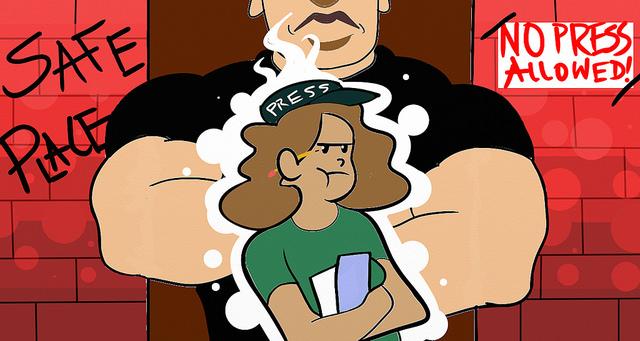Journalists not welcome
December 9, 2015
More than 50 years ago, Malcolm X criticized the media, saying, “It will make the criminal look like he’s the victim and make the victim look like he’s the criminal.”
This fall, students concerned about the treatment of minorities on campus revisited this critique, shutting the media out of protests at University of Missouri, Loyola University in Chicago and Claremont McKenna College in Southern California, among others.
Borrowing ideas that refer back to the Student Nonviolent Coordinating Committee of the 1960’s, protesters have begun taking matters into their own hands. By choosing to photograph and tweet about protests themselves—they take matters into their own hands—eliminating the media all together. They have begun demanding answers to a simple question: Why should we allow the media in if they distort our image and reduce us to cultural clichés?
Some facts are on the students’ side. According to the annual census conducted by the American Society of News Editors, minority groups represent a measly 10.4 percent of US journalists, which could contribute to minority issues being underrepresented or misrepresented.
But the protesters’ response pushes too far to the opposite extreme, shutting all media out, and thereby eliminating coverage altogether. Footage from the #ConcernedStudent1950 protests at the University of Missouri shows a journalism faculty member angrily telling journalists they can’t be in public spaces and can’t exercise their First Amendment rights.
Calls for a “safe space” to have a public discussion of important issues shouldn’t come with demands that deny those rights to anyone, including the media. It sets a nasty precedent that would lead to media coverage that is even more biased.
Theoretically, protesters and media should have a symbiotic relationship. Students create news stories, media covers it, everyone is happy. Theoretically.
Realistically, the relationship between protester and media has become much like a game of chicken. If neither side is willing to find common ground, the situation will only get worse.
The media need to achieve racial balance both in the workplace and in news coverage, and protesters need to acknowledge our credibility and respect our right to cover public events.
But until one side makes the first move, we will be stuck perpetuating the same racial issues as those that have come before us.







































































